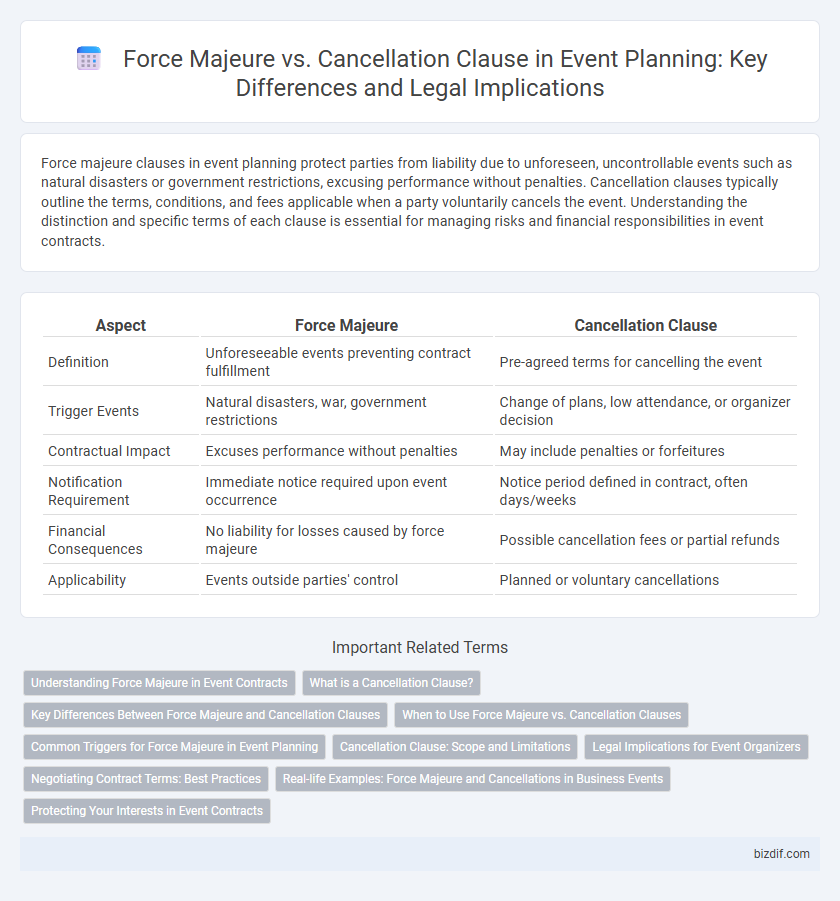Force majeure clauses in event planning protect parties from liability due to unforeseen, uncontrollable events such as natural disasters or government restrictions, excusing performance without penalties. Cancellation clauses typically outline the terms, conditions, and fees applicable when a party voluntarily cancels the event. Understanding the distinction and specific terms of each clause is essential for managing risks and financial responsibilities in event contracts.
Table of Comparison
| Aspect | Force Majeure | Cancellation Clause |
|---|---|---|
| Definition | Unforeseeable events preventing contract fulfillment | Pre-agreed terms for cancelling the event |
| Trigger Events | Natural disasters, war, government restrictions | Change of plans, low attendance, or organizer decision |
| Contractual Impact | Excuses performance without penalties | May include penalties or forfeitures |
| Notification Requirement | Immediate notice required upon event occurrence | Notice period defined in contract, often days/weeks |
| Financial Consequences | No liability for losses caused by force majeure | Possible cancellation fees or partial refunds |
| Applicability | Events outside parties' control | Planned or voluntary cancellations |
Understanding Force Majeure in Event Contracts
Force majeure clauses in event contracts protect parties from liability when unforeseeable circumstances like natural disasters, pandemics, or government actions prevent event execution. These provisions specify conditions under which contractual obligations are suspended or terminated without penalty, ensuring clarity on risk allocation. Understanding the distinction between force majeure and cancellation clauses helps organizers manage financial exposure and legal responsibilities effectively.
What is a Cancellation Clause?
A cancellation clause in event planning is a contractual provision that outlines the terms and conditions under which either party can cancel the event without facing penalties. It typically specifies deadlines for cancellation, applicable fees, and any required notice periods. This clause protects both the organizer and the venue by clearly defining financial and operational responsibilities in case the event cannot proceed as scheduled.
Key Differences Between Force Majeure and Cancellation Clauses
Force majeure clauses address unforeseen events beyond control, such as natural disasters or pandemics, that prevent contract fulfillment without penalty, while cancellation clauses detail the terms and conditions under which a party may terminate an event agreement, often involving fees or notice periods. Force majeure removes liability due to impossibility of performance, whereas cancellation usually involves planned termination with specific financial or procedural consequences. Understanding these differences is critical for event planners to manage risk and protect contractual obligations effectively.
When to Use Force Majeure vs. Cancellation Clauses
Force majeure clauses are essential when unforeseeable events such as natural disasters, pandemics, or government actions disrupt the ability to hold an event, allowing parties to suspend or terminate obligations without liability. Cancellation clauses, in contrast, govern voluntary termination of the contract by either party, often specifying penalties, notice periods, and refund policies. Use force majeure clauses to manage risks from unavoidable events beyond control, while cancellation clauses apply when a party chooses to cancel under agreed-upon terms.
Common Triggers for Force Majeure in Event Planning
Common triggers for force majeure in event planning include natural disasters such as hurricanes, earthquakes, and floods that make the venue inaccessible or unsafe. Other triggers encompass government actions like travel bans, state emergencies, or public health crises that restrict gatherings or impose lockdowns. Labor strikes, terrorism, and unforeseen infrastructural failures also frequently invoke force majeure clauses, releasing parties from contractual obligations without penalties.
Cancellation Clause: Scope and Limitations
The cancellation clause in event planning defines the terms under which either party may terminate the contract without penalty or with specified fees, clarifying the scope and limitations of cancellations. It typically outlines acceptable reasons for cancellation, required notice periods, and potential financial obligations, ensuring both parties understand their rights and responsibilities. Clear cancellation clauses help mitigate disputes by setting expectations for refunds, rescheduling options, and force majeure exclusions.
Legal Implications for Event Organizers
Force majeure clauses legally protect event organizers from liability when uncontrollable events, such as natural disasters or pandemics, force cancellation or postponement. Cancellation clauses specify penalties or refunds but may not cover extraordinary circumstances, potentially exposing organizers to financial risk. Understanding the precise legal language and jurisdictional impacts of these clauses is essential for mitigating contractual disputes and safeguarding organizer interests.
Negotiating Contract Terms: Best Practices
Negotiating contract terms for event planning requires clear differentiation between force majeure and cancellation clauses to minimize financial risks. Force majeure clauses should explicitly define unforeseeable circumstances like natural disasters or government restrictions that excuse non-performance without penalties. Cancellation clauses need precise conditions and timelines for termination, including associated fees or refunds, ensuring both parties have clear expectations and protections.
Real-life Examples: Force Majeure and Cancellations in Business Events
Force majeure clauses often protect event organizers from liability in cases of unforeseen disasters, such as natural calamities or pandemics, which forced major conferences like the 2020 Mobile World Congress cancellation to avoid financial losses. Cancellation clauses typically require advance notice and may impose penalties, as seen in the cancellation of corporate retreats due to logistical failures or insufficient bookings, where both parties absorb specific costs. Understanding the distinct terms of force majeure versus cancellation clauses helps businesses navigate risks effectively and allocate responsibilities in event contracts.
Protecting Your Interests in Event Contracts
Force majeure clauses protect event organizers by excusing performance when unforeseen, uncontrollable events like natural disasters or pandemics occur, while cancellation clauses outline the terms and financial consequences if a party opts to terminate the event. Carefully drafting these provisions ensures risk allocation and limits liability, preserving financial security and minimizing disputes. Prioritizing clear definitions and specific triggers in force majeure and cancellation terms safeguards your investments and contractual interests in event contracts.
Force majeure vs Cancellation clause Infographic

 bizdif.com
bizdif.com